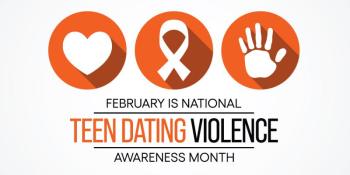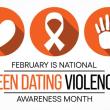What’s a healthy relationship, anyway?
John: “Where have you been? I’ve been calling you for two hours!”
Laura: “I’m OK. I was out with a friend.”
John: “Out where? What friend? What’s his name?”
Laura: “It wasn’t a boy!”
John: (strained voice) “Where are you now? I’m coming to get you.”
Laura: “You can’t! I’m home and dinner is almost ready. I can’t go out now!”
John: “You should have thought about that before you went somewhere without me and without telling me.”
Laura: “We just went to the mall for a while. Please don’t come here.”
John: “I’m on my way. Be ready.” Hangs up thinking, “Stupid girl.”
__________________________________________________________
Liz: “I see you looking at her.”
Marc: “What are you talking about? I just looked up because I saw someone coming in the room out of the corner of my eye.”
Liz: “‘Just looked up?’ You were checking her out. That wasn’t a glance – over in two seconds. I’ve told you not to check out other girls. Do you know how that makes me feel?”
Marc: “I’m sure you’re going to tell me …”
Liz: (kicks him quick and hard under the table) “Don’t. Be. Smart. You know how I feel about getting attitude from you.”
Marc: (Standing up) “I’m leaving.” Liz grabs his arm. Marc smoothly and cooly pulls his arm away and walks toward the door.
Liz: “Come back here!” in a loud hiss, looks around at other diners looking at her. “What are you looking at?” she shouts at them.
Power and control. Some people must have both in order to keep someone they like or love in line; 33% of adolescents in America are victim to sexual, physical, verbal, or emotional dating abuse (dosomething.org). And only one in three confided in someone about the violence.
February is Teen Dating Violence Awareness Month. This national annual observance is dedicated to educating teens about what a healthy relationship is and what the characteristics of unhealthy relationships are. This year’s theme, “Love Like That,” was chosen by the love is respect Youth Council, to help teens express their love in positive, healthy ways.
The following statistics are from dosomething.org:
*Violent behavior often begins between sixth and 12th grade; 72% of 13 and 14-year-olds are “dating.”
*Females between the ages of 16 and 24 are roughly three times more likely than the rest of the population to be abused by an intimate partner.
* Roughly 1.5 million high school boys and girls in the U.S. admit to being intentionally hit or physically harmed in the last year by someone they are romantically involved with.
* Teens who have been abused hesitate to seek help because they do not want to expose themselves or are unaware of the laws surrounding domestic violence.
Check out this first person account (abbreviated) on loveisrespect.org by Alexis O., former National Youth Advisory Board member: “I knew that he was wrong for me from the minute he told me that I was his girlfriend so he could do whatever he wanted to me, whenever he wanted. This came after I got angry with him for being too clingy and grabby in public. When I thought it over later and decided to break up with him, I tried. But he cried and told me he was sorry, and that it would never happen again, that he loved me more than anyone he had ever met ...That’s the thing about abusers. They are not wholly evil. And they are (such) damn good liars that sometimes they even fool themselves. But if they get away with something once, they start pushing their boundaries and pretty soon they are telling you that they didn’t rape you because you never said no, in fact you didn’t say anything. I remembered that promise I made to myself as a little girl to never end up like my mother, and I left.
“The thing about unhealthy relationships is that we want to believe that person can change. We want to believe that if we stick around they will stop insulting us to keep us with them longer. That they will get over their rough patch in life and they won’t have to hit us when we mess up. But I am here to tell you as a survivor of multiple types of abuse that they don’t change, and it is important to realize that. For a person to change, they have to want it, and abusers are oftentimes in denial about who they are, so they are going to get angry for you even suggesting there is something wrong with who they are as a person. You have the right to tell someone... It is not your fault they abuse you, physically, verbally, or emotionally. It is never your fault.
“In a healthy relationship you are not afraid of your partner’s anger, because they aren’t a threat to you. You respect each other, have lives that are separate from each other, but can come back and be a unit at any given time. In healthy relationships, both parties have a right to privacy. If your partner is forcing you to allow them to read your text messages or emails or Facebook messages, there is a problem. Remember, love is respect. And you deserve that. Don’t settle for anything less.”
Some years ago, a play entitled “Jake & Caroline” was performed in high schools and colleges including Boothbay Region High School, annually. A Q&A was held following each performance with the two presenters, affiliated with The Young Adult Abuse Prevention Program. Post Q&A, students were given an opportunity to talk one-on-one with the presenters, or one of them.
Another presentation, also for high school students – specifically juniors and seniors, was “The Yellow Dress.” A powerful story of a 16-year-old girl in a verbally, physically and sexually abusive relationship that does not end well. This presentation was also given at BRHS.
Don’t kid yourself – it happens here, there … everywhere. The Maine Coalition To End Domestic Violence website reports the following: In Maine, 8.3% of Maine high school students report that someone they were dating or going out with physically hurt them on purpose at least once in the preceding year. The percentage was higher for LGBTQ students (19.2%) and bisexual students (18.3%) than for heterosexual students (6.7%). And yet, 81% of parents believe teen dating abuse is not an issue, or admit they don’t know if it’s an issue. Knowledge is power and, for someone in an abusive relationship, it could save a life. Maybe yours. Maybe your daughter or son’s life.
More information can be found at www.loveisrespect.org, https://newhopemidcoast.org and https://findingourvoices.net. Need someone to talk to? The Health Center at BRHS has counselors ready to help. A list of local therapists can be found at www.psychologytoday.com/us/therapists/me/boothbay-harbor




































